- Home
- George R. R. Martin
Old Mars Page 45
Old Mars Read online
Page 45
As Tyr shook his whip loose from the sailor’s neck, Jason took stock of the situation. A half dozen of his crewmen had boarded the corvette along with him and the first officer, and a quick accounting showed that all of them were still standing, having at worst suffered only minor wounds. All of the Praxian sailors in evidence were fallen at their feet.
“It would seem that the ship is ours,” Tyr said, coiling his whip.
“Take a few men belowdecks,” Jason instructed, “and make sure there aren’t more of the ship’s crew down there that we’ll need to worry about before we move on to the galleon. We’ll have enough trouble dealing with the sailors who boarded the—”
“Captain!” one of the pirates shouted.
Jason turned quickly in that direction. Through the sand that gusted all around them, he could see across to the galleon, lashed by grappling hooks to the side of the corvette.
An entire detachment of Praxian sailors were surging over the railing from the galleon, murder in their eyes.
“Never mind.” Jason flashed Tyr a quick smile. “You get the idea.”
There had been a time when the mere sight of a pink-skinned figure breathing air had been enough to give Jason’s opponents a moment’s pause, usually just enough for him to gain a tactical advantage against them. But enough stories had circulated in the years since of the so-called human who sailed the sand seas aboard a pirate vessel, that Jason had largely lost the element of surprise. That he’d grown older in the interim, and no doubt needed that moment’s advantage now more than ever, was a cruel irony that was not lost on him.
So it was with a labored sigh that Jason met the sailors’ charge. Not one of them even blinked when they saw his skin, his hair, or his lack of gills.
He felt like a once-popular TV star, now reduced to offering autographs to uninterested passersby at a boat show …
If taking the corvette had been comparatively easy, at the cost only of a few minor injuries, defending it from the returning sailors would clearly come at a higher price. The corvette’s crew outnumbered the pirates three to one, and though Jason had always boasted that each of his crewmen was worth any three other fighters combined, proving that boast was more difficult in practice than it had been in theory.
While Tyr and two other pirates dealt with the sailors who had been belowdecks manning the launchers, the rest contended with those who had returned from taking the galleon. And Jason himself faced the master of the corvette, who bore the rank insignia of a commodore in the Praxian navy tattooed on his forehead. At the end of one arm, the commodore carried a sword, and, in the other, a burning torch.
Jason was surprised to see the open flame. The natives of the red planet typically used fire only for manufacturing purposes, most often in foundries on rocky atolls far from their aquatic homes in the canal networks. It was not entirely unknown for fire to be used as a weapon, but it was far from common.
“You are either brave, mad, or a fool,” the commodore said in a heavy Praxian accent. “But whichever it is, you will die!” To punctuate his words, he lunged forward with his sword, aiming it squarely at Jason’s chest.
“Everything dies, commodore.” Jason parried the Praxian’s lunge and flashed a smile. “So I’m certain I’ll die eventually.” Jason riposted, thrusting his own sword at the commodore. “But not today!”
The commodore hissed menacingly as he sidestepped Jason’s sword, barely avoiding the thrust.
“You, a pirate, would protect these … these heretics?” The commodore’s anger was almost palpable. “But why?”
Heretics? Jason scarcely had time to think, as the commodore swung the torch he bore at Jason’s head.
Jason danced back out of the way, feeling the warmth of the torch on his face. Had he been a native Martian, the heat itself would have been enough to dry his eyes for an instant, forcing opaque nictitating membranes to slam shut, momentarily obscuring his vision. No doubt that was the reason the commodore took the risk of fighting while carrying an open flame. But Jason’s eyes simply stung and watered, and though his lids squinted against the heat and smoke, he never lost sight of his opponent’s position.
But he allowed the commodore to think that he had.
Eyes half-lidded, one hand groping erratically through the air in front of him, Jason feinted with his sword, aiming well clear of the commodore’s body. He could hear the soft clacking of mandibles as the commodore chuckled to himself, sure now of an easy victory.
As the commodore lunged forward, aiming his sword at Jason’s midsection in a killing thrust, Jason handily sidestepped at the last moment. Natives were always surprised by how quickly Jason could move in the lower gravity of the red planet and how much stronger he was than he appeared, facts that he had long since learned to use to his advantage. Before the startled commodore could react, Jason brought his sword slamming down on the commodore’s breather, slashing the back of the commodore’s head in the process.
The commodore pitched forward, gasping for breath, dropping both sword and torch as he groped for the back of his head, where dark green blood was already welling freely.
Jason reached for the still-burning torch as it clattered away across the deck, but before he could grab it, another of the Praxian sailors, following close on the commodore’s heels, rushed at him, swinging a heavy club. For every one of the precious few moments it took Jason to fend off the sailor, he worried over where the torch would end up. Like most of the ships that plied the red planet’s sand seas, the corvette was primarily composed of a kind of lightweight concrete, sturdy enough to be a considerable weight but with enough pockets of air throughout that it was not too heavy to glide across the sands. More important, although the concrete itself was largely impervious to flame, the planks were mortared with a tarlike substance that wasn’t. Careless fire management would leave a ship as little more than a charred pile of planks and spars, its crews left stranded on the sands at the tender mercy of scavengers like the leatherwings and the sand-sharks.
So it was with a weary sigh that, as soon as he dispatched the club-wielding sailor, Jason turned to see that the commodore’s torch had come to rest atop the seam between two planks in the deck, and that traceries of flame already raced in either direction, following the mortar’s path.
“Captain!” Tyr shouted, having just returned from belowdecks, a freshly bleeding cut across his left shoulder. “Fire!”
“I see it!” Jason glanced about the deck of the corvette. He had lost two of his men in the skirmish, and including Tyr, three more were wounded, but the last of the Praxian sailors appeared to have been seen to. But already the flames had reached both fore and aft, and had leapt to the corvette’s sails, which were slowly transforming to smoke and ash.
“The Argo is out beyond the range of the Praxian launchers,” Tyr shouted. “She’ll never reach us in time!”
Jason scowled. The order for the Argo to retreat after he and the others boarded the corvette had been his. He had no one to blame but himself if it meant his death now.
“Cut the grappling lines!” Jason shouted, as he leapt over the flames, heading for the railing. “If we’re lucky, we can get the galleon clear before it catches fire, too!”
Tyr and the other surviving pirates needed no further instruction, but scrambled over the side of the corvette and onto the galleon’s deck, severing the heavy lines that held the two vessels together as they went.
Jason was the last one to leave the corvette, as the deck planks began to fall apart beneath him. Tyr and the others had already begun to shove the merchant ship away from the corvette, using long sections of the galleon’s shattered masts to push against the hull of the other ship. But as Jason thudded onto the deck of the galleon, twisting one knee badly in the process, bits of burning sail and ash rained down around him.
“We need to move this tub!” Jason shouted as he clutched his knee in agony, sprawled on the deck. “And somebody put out these flames before they spread!”
> A pair of Jason’s crewmen scrambled around the deck of the galleon, stomping out the burning bits of sail, while Tyr directed the others in using the longest pieces of the broken mast to push the two vessels as far apart as possible. Black smoke intermingled with the sands that the heavy winds were blowing across from the corvette, but just when it appeared that all hope was lost, the winds shifted, blowing back over the Praxian ship, sending smoke, ash, and licking flames out over the sands instead.
Tyr helped Jason to his feet as they watched the burning pyre of a ship drift away from them across the sands. It had taken all the strength the pirates could muster to get the corvette to move, but now that it was in motion, its inertia would continue to carry it away from them. Not far, but far enough.
“Well,” Jason said, “let’s go belowdecks and see what she’s carrying.”
“Whatever it is,” Tyr answered as he helped Jason limp across the deck, “the Praxians very much wished to possess it.”
Jason was thinking back to what the commodore had said, puzzling over it, when Tyr lifted up the hatch in the deck that led down to the galleon’s hold.
As the two stared down into the hold, Jason’s mouth hung open in surprise, and Tyr tapped the drystone amulet at his breast.
“Or perhaps it is something they did not wish to possess,” Tyr muttered, “but to destroy.”
Down in the gloom of the galleon’s hold, dozens of frightened eyes glinted up at them.
They spoke a dialect that Jason had trouble following, and it was clear they had difficulty understanding his accent, but Tyr was able to act as interpreter. They were mothers and fathers, children, grandparents, all crowded together in the cramped confines of the galleon’s hold. Rather than wearing personal breathers, as Jason’s crewmen and the Praxian sailors did, they huddled around portable dispensers that sprayed brief jets of lukewarm water from short hoses, keeping their skin as damp and their gills as oxygenated as they could manage. But all of them had taken on the greyish brown tint to their skins that suggested they were close to the point of complete dehydration and suffocation.
The drystone amulets that each of them clutched marked them as worshippers of the Suffocated God. There was some irony in the fact that they might emulate their martyred god not only in the way that he had lived but also in his manner of dying.
“They are Praxian refugees,” Tyr explained, “fleeing oppression.”
Jason could see that Tyr was having difficulty controlling his temper but seemed mollified whenever the refugees addressed him with the word that Jason recognized as meaning “Reverend.” It had been many years since Tyr had been a priest, but it was clear that it was a role that still held great meaning for him.
“They say that things have gotten even worse in Praxis,” Tyr continued. “The Hegemony continues to chip away at the freedoms of those they rule. Once, one was censured for speaking out against the Hegemony’s tenets or questioning their right to govern. Now, it seems, simply harboring private beliefs that are not sanctioned by the Hegemony is grounds for punishment.”
Jason noted the scars that many of the older refugees bore, signs of flogging, torture, and worse. Some were even missing digits at the ends of their arms or had empty sockets where eyes had once been. And all of them, from the oldest to the youngest, had the kind of haunted expression on their faces that made it clear that they had seen things that scarred their minds and souls in ways that could never fully heal.
“They made a deal with a Vendish merchant, the master of this galleon, to ferry them north across the sands to Vend,” Tyr said, his tone bitter. “They hoped to find a new home there, where they would enjoy the freedom to practice their beliefs in peace.”
Jason sneered. The mention of “freedom” in such close proximity to “Vend” was a bitter irony.
“How much money do they have?” Jason asked, acid in his tone.
Tyr repeated the question to the refugees, who answered him with confused expressions and bewilderment.
“They don’t understand,” Tyr said. “None of them have ever held or used currency before.”
In Praxis, all things were held in common, apportioned by the ruling Hegemony to each according to his needs. At least, that was the theory. In practice, most of the population lived in crushing poverty, assuming that it was simply their lot in life.
“Ask them what they have of value,” Jason clarified. “They must have traded something precious to this merchant in exchange for passage—jewelry, heirlooms, goods. How much of that is left?”
Tyr relayed the question. The refugees looked from one to another, then answered.
“They gave everything they had of value to the Vendish merchant,” Tyr translated. “They have nothing left.”
Jason slammed a fist into the open palm of the other hand, seething with frustrated rage. He was angry at the Vendish merchant who had agreed to ferry the refugees and angry with the refugees themselves for clearly being duped.
“This ship wasn’t sailing them to freedom in Vend!” Jason shouted. “They were heading toward slavery!”
Tyr answered in a low voice, speaking for himself, not for the refugees. “Captain … Jason … they’ve been through so much already …”
“No,” Jason shot back, “they should know. You know what I’m talking about. Tell them!”
Tyr’s mandibles quivered, the native equivalent of a sigh. And then he turned back to the refugees, and in patient tones explained to them the reality of the situation.
Jason could follow little of what Tyr was saying, but it hardly mattered since he could guess. It was well-known on the sand seas that it was against the law in Vend to be a vagrant. And anyone who set foot in the waters of Vend was considered a vagrant if they could not establish proof of residency. Anyone who was apprehended on charges of vagrancy could buy their way out if they had sufficient funds to secure lodging. But if not, they would be arrested on the spot, declared guilty without a trial, and sold into indentured servitude. In theory, an indentured servant could eventually earn their way to freedom; in practice, it never happened.
It was easy to see what the master of this galleon had intended. The few trinkets and baubles he’d taken from the refugees might have had some minor value, but the real prize would come when they reached Vend. It was a common practice for the portmasters of Vend to make deals with ship captains to “arrange” for an unwanted or problematic crewman to be arrested for vagrancy, with the portmaster sharing the proceeds from the sale into indentured service with the captain who had supplied them. Some pirate captains even engaged in the practice, taking prisoners from among the crews of ships that they defeated and transporting them north to be sold into service. It effectively amounted to a kind of slave trade, but one that was entirely legal under the laws of Vend.
So the refugees had sailed away from one form of oppression, and had been heading right toward another.
From the howls of despair that they began to make, Jason could tell that Tyr had managed to get that point across.
“So what shall we do with them, then?” one of the pirates asked, once Jason and Tyr were back above deck.
The Argo had sailed up alongside the galleon, as the winds that had whipped up the sandstorm gradually died away, and now the entire crew had been made aware of the nature of their “plunder.” It simply remained to decide what they would do about it.
“What is to decide?” another pirate asked. “They are none of our lookout. The wind and the sand-sharks will see to them soon enough.”
Jason had to admit that the crewman was right about one thing, at least. From the deck of the ruined galleon, he could see the signs of sand-sharks skimming through the fine grains of desert sands, searching for prey. If the refugees were foolish enough to try to travel across—or rather through—the sands, they would not last long. Even assuming that their portable dispensers had enough water within them to keep the refugees from suffocating and desiccating in short order, the sand-sharks would ma
ke a meal of them soon enough.
But while that crewman, at least, seemed perfectly content to leave the Praxian refugees to their own devices, it was clear that others among the pirates were not as sanguine about the possibility. And his first officer in particular.
Tyr clutched the drystone pendant that hung from his breather, a haunted look on his face. Jason imagined that he must be remembering his own family and friends whom he had been forced to leave behind when the two of them escaped from a Praxian prison half a lifetime ago, and thinking about what horrors they might have endured because of their faith in the years since. In the faces of the despairing refugees, Tyr no doubt saw all of those people reflected.
“We could return them whence they came,” another said.
“Back into the oppression they narrowly escaped?” Tyr scoffed. “We would be condemning them to agony and death. Perhaps instead we could ferry them on to Vend. At least there they would have a chance at life.”
Another crewman made a gesture that carried much the same nuance as a human spitting on the ground in disgust. “At least the Praxians believe they serve a greater good. Those Vendish devils serve nothing but their own profits.”
“It would be a mercy to kill them ourselves and be done with it,” another pirate put in.
A ripple of nods among the other crewmen showed this would be an acceptable solution to the ethical dilemma for many of them.
Life on the red planet was hard and had produced cultures that tended to make hard decisions. But life on the sand seas was harder still.
“No,” Jason announced. “They’re coming with us.”
The crewmen all turned to him, some with confused looks, some with expressions of defensiveness.

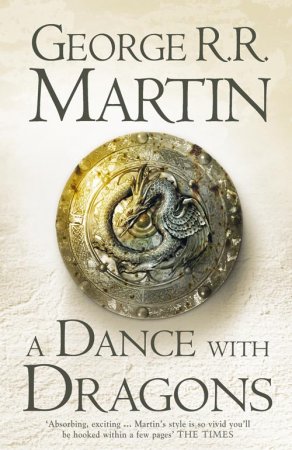 A Dance with Dragons
A Dance with Dragons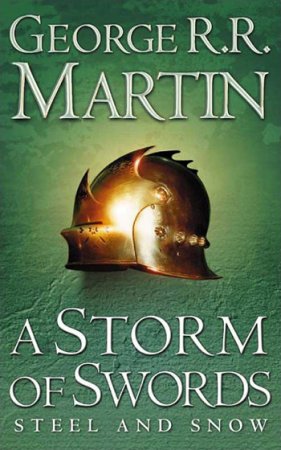 A Storm of Swords
A Storm of Swords A Feast for Crows
A Feast for Crows A Clash of Kings
A Clash of Kings A Game of Thrones
A Game of Thrones Mississippi Roll
Mississippi Roll Wild Cards V: Down and Dirty
Wild Cards V: Down and Dirty Busted Flush
Busted Flush When the Devil Drives
When the Devil Drives Dying of the Light
Dying of the Light The Ice Dragon
The Ice Dragon Sandkings
Sandkings Jokertown Shuffle
Jokertown Shuffle Dreamsongs. Volume II
Dreamsongs. Volume II Deuces Down
Deuces Down When We Were Heroes
When We Were Heroes Warriors
Warriors In the House of the Worm
In the House of the Worm Death Draws Five
Death Draws Five Dreamsongs. Volume I
Dreamsongs. Volume I Marked Cards
Marked Cards Dreamsongs
Dreamsongs Card Sharks
Card Sharks Dangerous Women
Dangerous Women Inside Straight
Inside Straight Turn of the Cards
Turn of the Cards Fevre Dream
Fevre Dream High Stakes: A Wild Cards Novel
High Stakes: A Wild Cards Novel Windhaven
Windhaven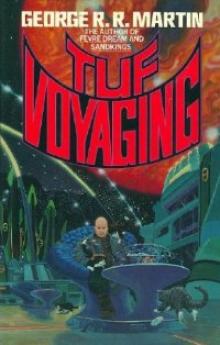 Tuf Voyaging
Tuf Voyaging Double Solitaire
Double Solitaire The Sworn Sword
The Sworn Sword Low Chicago
Low Chicago Dead Man's Hand
Dead Man's Hand Wild Cards
Wild Cards Black Trump
Black Trump One Eyed Jacks
One Eyed Jacks Wild Cards: Aces Abroad
Wild Cards: Aces Abroad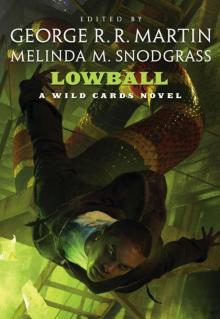 Lowball: A Wild Cards Novel
Lowball: A Wild Cards Novel Double Solitaire (2019 Edition)
Double Solitaire (2019 Edition) Dealer's Choice
Dealer's Choice Ace in the Hole
Ace in the Hole A Song for Lya: And Other Stories
A Song for Lya: And Other Stories Three Kings
Three Kings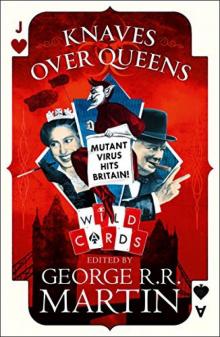 Knaves Over Queens
Knaves Over Queens Joker Moon
Joker Moon One Eyed Jacks wc-8
One Eyed Jacks wc-8 Down And Dirty wc-5
Down And Dirty wc-5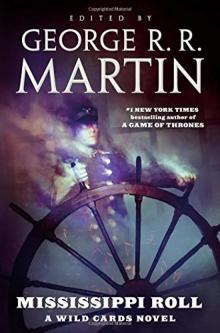 Mississippi Roll_A Wild Cards Novel
Mississippi Roll_A Wild Cards Novel A Feast for Dragons
A Feast for Dragons The Sworn Sword ttodae-2
The Sworn Sword ttodae-2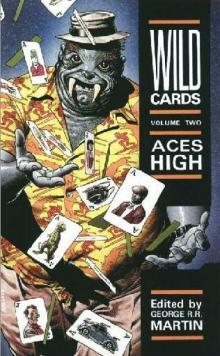 Aces High wc-2
Aces High wc-2 Wild Cards 13 : Card Sharks
Wild Cards 13 : Card Sharks Way of the Wizard
Way of the Wizard Wild Cards VIII: One-Eyed Jacks
Wild Cards VIII: One-Eyed Jacks A Dance With Dragons: Book 5 of A Song of Ice and Fire (Song of Ice & Fire 5)
A Dance With Dragons: Book 5 of A Song of Ice and Fire (Song of Ice & Fire 5) The Princess and The Queen, Or, The Blacks and The Greens (a song of ice and fire)
The Princess and The Queen, Or, The Blacks and The Greens (a song of ice and fire) Wild Cards VI--Ace in the Hole
Wild Cards VI--Ace in the Hole The World of Ice & Fire: The Untold History of Westeros and the Game of Thrones (A Song of Ice and Fire)
The World of Ice & Fire: The Untold History of Westeros and the Game of Thrones (A Song of Ice and Fire) The World of Ice & Fire: The Untold History of Westeros and the Game of Thrones
The World of Ice & Fire: The Untold History of Westeros and the Game of Thrones Busted Flush wc-19
Busted Flush wc-19 A Knight of the Seven Kingdoms
A Knight of the Seven Kingdoms Nightflyers: The Illustrated Edition
Nightflyers: The Illustrated Edition Wild Cards IV
Wild Cards IV Portraits of His Children
Portraits of His Children Dead Mans Hand wc-7
Dead Mans Hand wc-7 Jokers Wild wc-3
Jokers Wild wc-3 The Lonely Songs of Laren Dorr
The Lonely Songs of Laren Dorr Wild Cards III: Jokers Wild
Wild Cards III: Jokers Wild A Game of Thrones Enhanced Edition
A Game of Thrones Enhanced Edition Nightflyers & Other Stories
Nightflyers & Other Stories Armageddon Rag
Armageddon Rag Wild Cards: Inside Straight
Wild Cards: Inside Straight A Song for Lya
A Song for Lya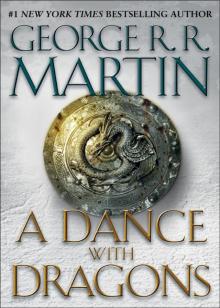 A Dance with Dragons: A Song of Ice and Fire: Book Five
A Dance with Dragons: A Song of Ice and Fire: Book Five Song of Fire & Ice 01 - A Game of Thrones
Song of Fire & Ice 01 - A Game of Thrones Death Draws Five wc-17
Death Draws Five wc-17 Turn of the Cards w-12
Turn of the Cards w-12 Wild Cards 14 - Marked Cards
Wild Cards 14 - Marked Cards Hunter's Run
Hunter's Run The Glass Flower
The Glass Flower A Clash of Kings asoiaf-2
A Clash of Kings asoiaf-2 A Game of Thrones 5-Book Bundle: A Song of Ice and Fire Series: A Game of Thrones, A Clash of Kings, A Storm of Swords, A Feast for Crows, and A Dance with Dragons (Song of Ice & Fire)
A Game of Thrones 5-Book Bundle: A Song of Ice and Fire Series: A Game of Thrones, A Clash of Kings, A Storm of Swords, A Feast for Crows, and A Dance with Dragons (Song of Ice & Fire) Ace In The Hole wc-6
Ace In The Hole wc-6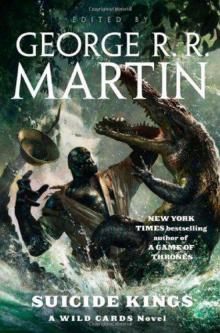 Suicide Kings wc-20
Suicide Kings wc-20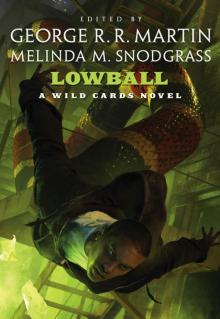 Lowball
Lowball Aces Abroad wc-4
Aces Abroad wc-4 George R. R. Martin's a Game of Thrones 4-Book Bundle
George R. R. Martin's a Game of Thrones 4-Book Bundle A Feast for Crows asoiaf-4
A Feast for Crows asoiaf-4 A Game of Thrones asoiaf-1
A Game of Thrones asoiaf-1 The Mystery Knight ttodae-3
The Mystery Knight ttodae-3 Double Solitaire w-10
Double Solitaire w-10 Wild Cards 15 - Black Trump
Wild Cards 15 - Black Trump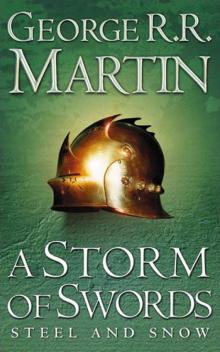 A Storm of Swords asoiaf-3
A Storm of Swords asoiaf-3 The Hedge Knight ttodae-1
The Hedge Knight ttodae-1 Dreamsongs 2-Book Bundle
Dreamsongs 2-Book Bundle The World of Ice & Fire
The World of Ice & Fire Starlady & Fast-Friend
Starlady & Fast-Friend Old Mars
Old Mars Fantasy For Good: A Charitable Anthology
Fantasy For Good: A Charitable Anthology Wild Cards V
Wild Cards V A Dance with Dragons asoiaf-5
A Dance with Dragons asoiaf-5 Dealer's Choice w-11
Dealer's Choice w-11 The Book of Magic
The Book of Magic A Game of Thrones 4-Book Bundle
A Game of Thrones 4-Book Bundle Texas Hold 'Em
Texas Hold 'Em Wildcards wc-1
Wildcards wc-1 Rogues
Rogues Old Venus
Old Venus